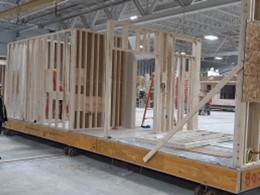In offsite modular construction, reaching a pinnacle of success is a significant achievement. Modular construction, known for its efficiency, sustainability, and cost-effectiveness, has transformed the construction industry. Still, very few have ever reached that elusive point where profitability is a given year after year.

.
However, for companies that have scaled this summit, a pressing question looms on the horizon: What next? The avenues for growth and expansion are manifold, but choosing the right path is pivotal.
I want to share the strategic options available to such companies and carefully explore the potential of continuing existing operations, horizontal integration, and vertical integration. What are the thought processes behind these decisions and the likelihood of sustained success?
Continuing the Core: Expansion within Existing Frameworks
For a successful offsite modular construction company, the allure of sticking to what you know is strong. This strategy involves amplifying what the company does best: selling more of its original product. The rationale is straightforward—capitalize on the established market presence, brand recognition, and proven product value. Expansion could mean entering new geographic markets or sectors within construction that the company hasn’t explored yet.
The thought process here revolves around leveraging existing strengths while minimizing risk. It’s about asking, “How can we do more of what we’re already doing well?” The success of this approach hinges on market demand and the scalability of current operations. However, it risks stagnation and vulnerability to market saturation or shifts in industry trends.
Exploring New Horizons: Horizontal Integration
Horizontal integration presents an intriguing path. This strategy involves acquiring or merging with companies that offer similar products or services, possibly in different regions or market segments. For an offsite modular construction company, this could mean buying out competitors or complementary businesses, such as modular designers or firms specializing in specific construction sectors like healthcare or education.
The thought process here is driven by a desire to broaden the company’s market share, diversify its product offerings, and achieve economies of scale. The critical questions include: “How can we create synergies with other companies? Can we achieve greater market dominance?” This strategy offers the chance to quickly scale operations and enter new markets. However, it comes with its challenges, including integration issues, cultural mismatches, and regulatory hurdles. The success of horizontal integration depends on the careful selection of acquisition targets and smooth integration processes.

.
Building the Ecosystem: Vertical Integration
Vertical integration offers a comprehensive growth strategy by acquiring businesses along the supply chain. This could involve taking control of suppliers of materials, design services, transportation, and on-site finishing services. The aim is to create a self-sustaining ecosystem that can deliver projects from concept to completion under one corporate umbrella.
The thought process for vertical integration is centered around control and efficiency. Key considerations include: “How can we reduce our costs and dependencies? Can we streamline our operations and improve margins?” This approach can lead to significant cost savings, improved project timelines, and enhanced quality control. However, it requires substantial investment and expertise in areas that may be outside the company’s core competencies. The challenges are not insignificant, involving managing a more complex operation and the potential for losing focus on the core business.
Weighing the Paths: Chances of Continued Success
The likelihood of continued success varies with each strategy, influenced by the company’s ability to execute and adapt. Continuing with the core business focuses on deepening existing strengths and is perhaps the least risky, but it may limit the potential for growth in a rapidly evolving industry. Horizontal integration promises quick expansion and diversified risk but requires careful management of merger complexities. Vertical integration offers control and efficiency gains but demands significant investment and operational expertise.
The decision-making process must consider the company’s long-term vision, market dynamics, financial health, and operational capabilities. Each strategy entails a different set of risks and rewards. Successful companies often blend these strategies, adapting their approach as they grow. For instance, a company might start by strengthening its core business, then move into horizontal integration by acquiring complementary firms, and eventually pursue vertical integration to consolidate its supply chain.
Taking the Next Step
For offsite modular construction companies pondering their next move after achieving success, the options are as diverse as they are challenging. The decision between doubling down on the core business, seeking growth through horizontal integration, or aiming for control and efficiency via vertical integration is complex. It requires a nuanced understanding of the company’s strengths, the market’s needs, and the broader industry trends.
Ultimately, the path chosen will reflect the company’s vision for its future and its appetite for risk. While no strategy guarantees success, the thoughtful application of these growth avenues can pave the way for sustainable expansion and continued leadership in the evolving landscape of construction.
.
CLICK HERE TO READ THE APRIL ISSUE
.
Gary Fleisher is a renowned blogger and commentator on construction and housing trends, known for his insightful analysis of the industry.























